My Services.
Behavioral and Training Consultations and Charges.
I am now tied up with so many other areas of dog behaviour, including writing a book, TV work, Video’s, and work as an expert witness I now no longer take on new cases. My existing clients can still contact me.
YOUR HOME.
This is where nearly all my behavioural and training consultations are started, irrespective of the problem. Then we move to the area when the behaviour happens the most.
I work with both the dog and the owner, so there is no confusion about what is required. At the end of our session, you will understand exactly what you need to do to affect major changes.
You will also be given a pack that was put together with your dog’s behavioural or training problems in mind. You will also receive my DVD. Which explains and demonstrates my unique techniques
The reason for starting at your home is your relationship and the mutual respect with your dog is created there.
To change any behavioural or training problems, we need to start initially where the dog lives. Then move to the places where the problems normally occur.
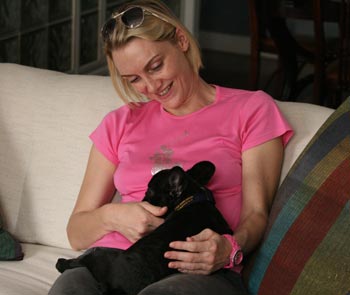
I currently have five dogs. four of them work in my practice. These dogs are specially trained and extremely effective when working with inter-dog aggression, as they will not aggress back. This allows me to come close with my dogs, so I can assess why the problem is occurring and therefore what treatment we need to use. My dogs are all highly-trained Working Cocker Spaniels and are also working gundogs.
My dogs help me to assess the type of aggression your dog may have. This allows me to put the best method of treatment in place. See Different Types of Aggression.
I find it difficult to understand why any trainer or behaviourist would hold a clinic in a veterinary surgery or office.
Dogs act totally different when outside their own environment. Working somewhere strange or unknown often subdues their natural inclinations.
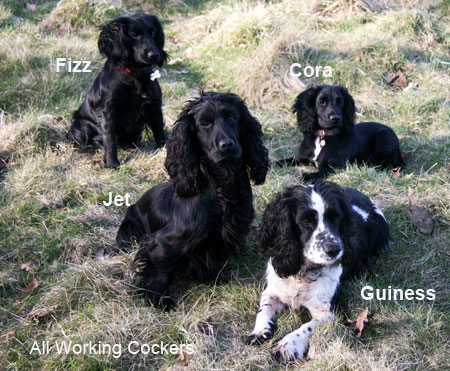
Masking the very behaviour I need to observe to treat your dog successfully. Are you aware that the people that claim they are “Clinical Behaviourists” are nothing more than behaviorists that see your dog in a clinic? I believe they may be falsely trying to impart that they are someone with clinical knowledge. Unless they are veterinary trained this would be totally incorrect. I believe this could be construed as misrepresentation.
What I believe to be vitally important, is that I am very hands-on with your dogs. I work with the dogs and the owners very closely and demonstrate with their dogs what they and you need to do.
I am not an impartial observer that tells them through a 50-page report what they have to do, yet appears unable or unwilling so show and demonstrate what they advise. How could I expect the owners to achieve the changes required without my ability to show the work they need to follow? Yet this is how many behaviourists work they do not handle the dogs at all, they do is just observe.
If they cannot handle your dog, then that suggests they are either not experienced or are nervous or actually incapable of doing the very things they are asking you to do. If you employ a behaviourist always ask first do they handle and teach you how to do certain vital exercises and behavioural work with the dog.
residential training.

I am intrinsically against residential training. I believe it is open to abuse. I have seen and heard of quite serious abuse whilst dogs are in some of these so-called training establishments.
The problem with residential training is it simply does not work at the level that is required to change psychological or behavioral problems.
Most aberrant behavior is about owner/dog relationships. Not pack alpha behavior or rank reductions programmes.
Owners are often reinforcing, (by accident) bad behavior or even causing fear, timidity and aggression by rewarding unwanted actions. Therefore, how could a residential course possibly sort these problems out? I specialize in all forms of behavioral and training problems.
I am an acknowledged expert in dog aggression both inter-dog and inter-human, fear-based behaviour, and the rearing and critical periods of puppies. However, I work with all types of behavioural and training problems. My experience is working with dogs for almost 40 years. The last 15 years as a fully insured professional dog behaviourist. There are no short cuts to experience and knowledge.
My Charges.
My unique methods mean that Over 98% of all my clients only need one behavioural counselling and training session.
All my clients have access to me either by phone or email for the rest of the dog’s life. That includes any problems that may arise later in life.
That problem may have nothing to do with the original problem I was called to work with. It does not mean I come to see you. It means I will either verbally, or by email, offer and send you a solution.
At the end of the behavioural and training session, you will get a free DVD and a pack with lots of information on how you move forward after the meeting.
You are also left with a comprehensive and easy to understand pack that gives you a clear and concise track to run on, tailored to your needs and the dog’s behaviour. You also receive a DVD with jingler techniques.
I am with you on average between 2.5 to 4.5 hours depending on the owner and the dog. It is vital to understand that I work not just with the dog but with the owner as well.
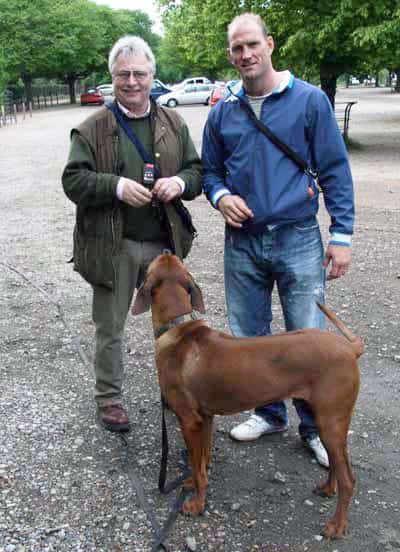
My charges are £1,200 for the full behavioural and training session, plus travelling at £1.50 per mile, except when travelling into London. It is then charged by time.
You will normally only need to see me once. This is because of my advanced techniques and innovative methods. If you have more than one dog you wish me to treat, I charge £900.00 for each extra dog.
If you wish to see me on a weekend the charge will be £1,300 for one dog.
Many people have described my abilities as magical, See Michele Hanson columnist for The Guardian and also a client of mine. But of course, it is not magic or sleight of hand. My methods are based on sound highly advanced and unique behavioral and training methods. To put my charges into context. Take your car into the garage and the average labor costs are £140 an hour. Some charge far more. All they do is repair the car, I change you and your dogs life. See Contact for details of my phone numbers and e-mail.
See My References from Clients.
"If you think it's expensive to hire a professional, then wait until you hire an amateur. Doesn't your dog deserve the best?"
Puppy Classes.
My classes normally fill up very quickly, therefore, it is important to book up early if possible.
See main Puppy Class page.
Socialisation early in your puppies lifecycle is critical to the well-being and behaviour of your dog in later life. This type of socialisation has been shown to be so beneficial, that it should be the most important and overriding factor in your pups life between 8 and 18 weeks of age.
I have held these classes now for over 19 years and they are based on my extensive knowledge of the critical periods in a puppies life. See Critical Period. Classes are held in Hampton and have only 8 to 10 puppies at any one time. this allows the trainers and staff to spend some individual time with each pup and owner.
We encourage children to come along if they are over 5 years of age so the pups can get used to being handled and around both adults and young children Classes cost £120.00 and are held in the Methodist Church Hall, Percy Road, Hampton Middlesex/Surrey border.
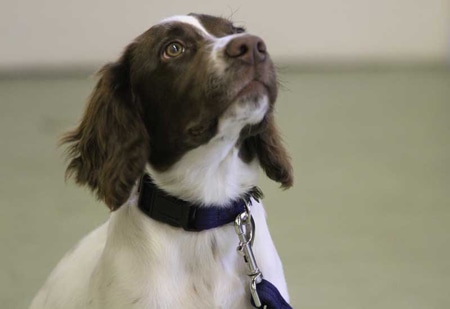
One of the exercises is pass the puppy, where everybody gets to handle all the other puppies in a kind and positive way. This builds up the pups confidence with strangers and children at a crucial age of learning.
I see many dogs that have a problem with children or adults later in life. My intention is that all the pups in my classes will not suffer these problems. I always try to have children there so they are being handled by adults and children in a kind and positive manner. We also let them play with the other puppies (closely supervised) for ten minutes each class, so the pups learn how to meet, greet and play nicely.
I hear of many classes that do not this. I have no idea why not, as this is how pups learn the all-important body language communication. They do not learn this from adult dogs. That is why they are called Puppy SOCIALISATION classes.
As long as the puppies have had their first injections and are over 8 weeks of age, then they are fine to come to these classes. see:
critical periods in your puppies psychological growth and fear and timidity, which explains just how important these classes are to the future behavior of your dog.
We have little competitions on a weekly basis, such as the best sit, the best down, and the sit stays walking to heel, down-stay. And prizes are awarded weekly. Which culminates in week six with the puppy that has learned the best trick. and a prize for which puppy has improved the most during the classes.
It is all a bit of fun, however, it does have a practical side. Owners tend to put more effort in if there is an enjoyable but slightly competitive element. The winners get a bag of treats or special goodbye bones, (for the dogs of course, not the humans). See more information Classes.
Puppy Assessments At your home.

I believe that this is a must for new puppy owners who are rearing puppies for the first time or even experienced owners who want to get it absolutely right for this dog.
This is a full personality test at your own home. It includes an appraisal to indicate your dog’s character and possible behaviour in later life; it also indicates the dog’s ability to learn and points to the methods that should work best for your individual dog.
This allows you to tailor your training to your dog’s individual temperament, aptitude, and ability. I believe this to be extremely important and should be considered for all new puppies, but is almost a necessity for first-time dog or puppy owners.
You may have this dog for upwards of 15 years and in some cases longer. What you do and how you train and develop your dog at this age is so vitally important, that shapes the behaviour of your puppy for the remainder of his or her life.
The assessment also covers sleeping arrangements, feeding, toileting, initial training schedules, training expectations, crate training and some important articles personally were written. These include “The Art of Communication” which explains how to communicate with your pet, what commands to give, when to praise and when not to praise. plus a checklist for socialising your pup and articles on first aid, basic obedience, and overcoming Nipping and Biting, Jumping up, and how to start your dog on lead work and especially Recall.
Done correctly at an early age, you should have no problems later when your matures and may get the wanderlust. My charges are £895.00 for the full assessment this includes access to me by phone and email for the remainder of the dog’s life. Travelling is charged at £1.00 per mile except when travelling onto London then it is based on time, parking and if required the congestion charge.
Expert witness assessments/ legal cases
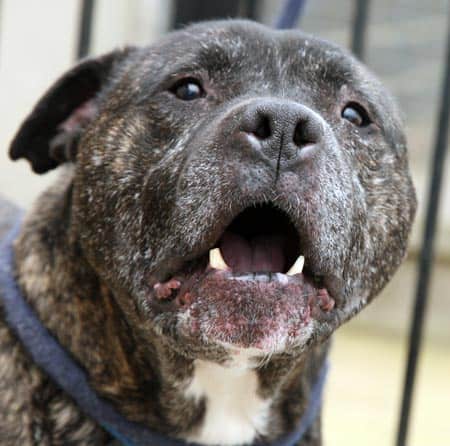
The Dangerous Dogs Act of 1991 and the Dogs Act 1871 are minefields for unsuspecting dog owners. I regularly work in the area of banned breeds section 1 of the DDA. as well as section 3 dangerously out of control in a public place. This includes assessing the current breeds that are banned under section 1. They include:
The America Pit Bull Terrier
the Japanese Tosa,
the Dogo Argentino,
the Fila Brasileiro
As an expert witness in court cases under these acts, part of my work is to assess dogs, that may have been seized by the police and held in isolation in secure kennels.
The police do not always get it right. Sometimes the dogs I assess, are clearly not one of the above-banned breeds. I then put my report and assessment into the solicitors and the case is debated in court. The outcome can rest on the length of a leg, or the distance from the nose to the stop or a head to shoulder ratio or even the stifle in the back legs.
It is important to note that, in the UK, dangerous dogs are classified by “type”, not by “breed label”. This means that whether a dog is considered dangerous, and therefore prohibited will depend on a judgement about its physical characteristics and whether they match the description of a prohibited ‘type’.
A little-known fact was that the 1991 Act was amended by the Dangerous Dogs (Amendment) Act 1997. The 1997 Act removed the mandatory destruction order provisions of the 1991 Act by giving the courts discretion on sentencing and re-opened the Index of Exempted Dogs for those prohibited dogs which the courts consider would not pose a risk to the public. Only courts can direct that a dog can be placed on the list of exempted dogs.
Another part of the Act is section 3. These are dogs that are deemed to be dangerously out of control in a public place. Any dog is deemed to be dangerously out of control if: it injures a person, or it behaves in a way that makes a person worried that it might injure them.
This is dogs that are deemed to be out of control when in a public place like a street, park, bus shelter or the common parts of a block of flats (like the entrance or stairs) or in a private place where the dog isn’t allowed to be.
Your dog does not have to bite someone to be deemed to have committed an offence. They may have frightened or made anxious a person or persons that believe that your dog might injure them. This could include jumping up lunging barking or growling.
The maximum penalty for allowing a dog you own or are in charge of to be dangerously out of control is two years’ imprisonment, or a fine, or both. And you will have a criminal conviction on your record.
If your dog injures another person’s animal or an owner of an animal reasonably believes that they could be injured if they intervened to protect their animal from your dog. Then an offence may be committed. If you do not keep your dog under control, your dog could be destroyed and you could be banned from keeping a dog. Or you might be ordered to keep your dog muzzled when walking, neutered, chipped, and placed on the dangerous dog’s register.
I have dealt with numerous cases in both categories. I have assessed many dogs for being of a banned type, and in some cases have successfully argued that the dog does not conform to the standard used to identify a banned breed.
I have also assessed and defended the independent assessment in court with a high rate of positive outcomes. Having said that I think it is important to state that I must remain impartial and independent. That means that if your dog is dangerous or a banned breed then my report will reflect this.
The Dangerous Dogs Act of 1991 is currently under review and looks certain to be amended regarding the law pertaining to dangerously out of control will be extended to your home or any private place rather than just in a public place.
If you have a dog that could be deemed out of control, either in or outside. Then I strongly suggest you get a trainer or behaviorist widely experienced in this area, to work with your dog. BEFORE you fall foul of the law. Please remember, your dog could be destroyed if found guilty of a breach of this Act, and you will get a criminal conviction and a very hefty fine if found guilty.
The picture above shows a dog I assessed a few years ago. This old boy had been in Solitary confinement/protective custody for over 18 months. He looks a real handful with an ear missing and teeth were broken. In reality, he was a pussycat and loved people and dogs. He had been seized as a pit-bull terrier. In reality, he was a Staffie Mastiff Bulldog cross.
After my assessment and report plus a court case, he is now back with his owners. Having said that, the majority of cases I assess are of pit bull type. Fortunately, I also assess for temperament. The courts now take that into consideration when deciding the fate of the dog.
For further information on the Act go to DOGLAW or to contact me Click HERE.
Shows and talks.
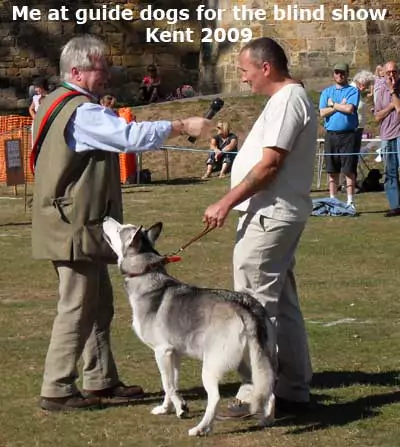
Would you like me to appear at your event? Call or Email me if you would like me to come to your club or show and do practical demonstrations with dogs from the audience, plus a fun and exciting talk on everything from critical periods to the origin of the dog, how dogs learn, and how to understand canine body language. I will stop dogs who I have never met before from jumping up, will get them walking to heel, sit, stay, stop barking, lunging, and some aggressive behaviours.
- If it is a large show I will need a hands-free microphone and PA system.
- If it is a hall I have all my own projectors and powerpoint presentation equipment.
I also talk at breed and dog club meetings. I can offer a variety of subjects including Aggression, Fear-based behaviour, Dominance, History of The Dog, The Pushy Dog, Attention Seeking, Toilet Problems, Breeder Advice and how to socialise a dog from birth to 16 weeks. This is the most critical period in a dog’s life and the breeders and owners have an enormous impact on how the dogs will turn out.
Please ring me to discuss your requirements with Stan Rawlinson Contact me HERE.

